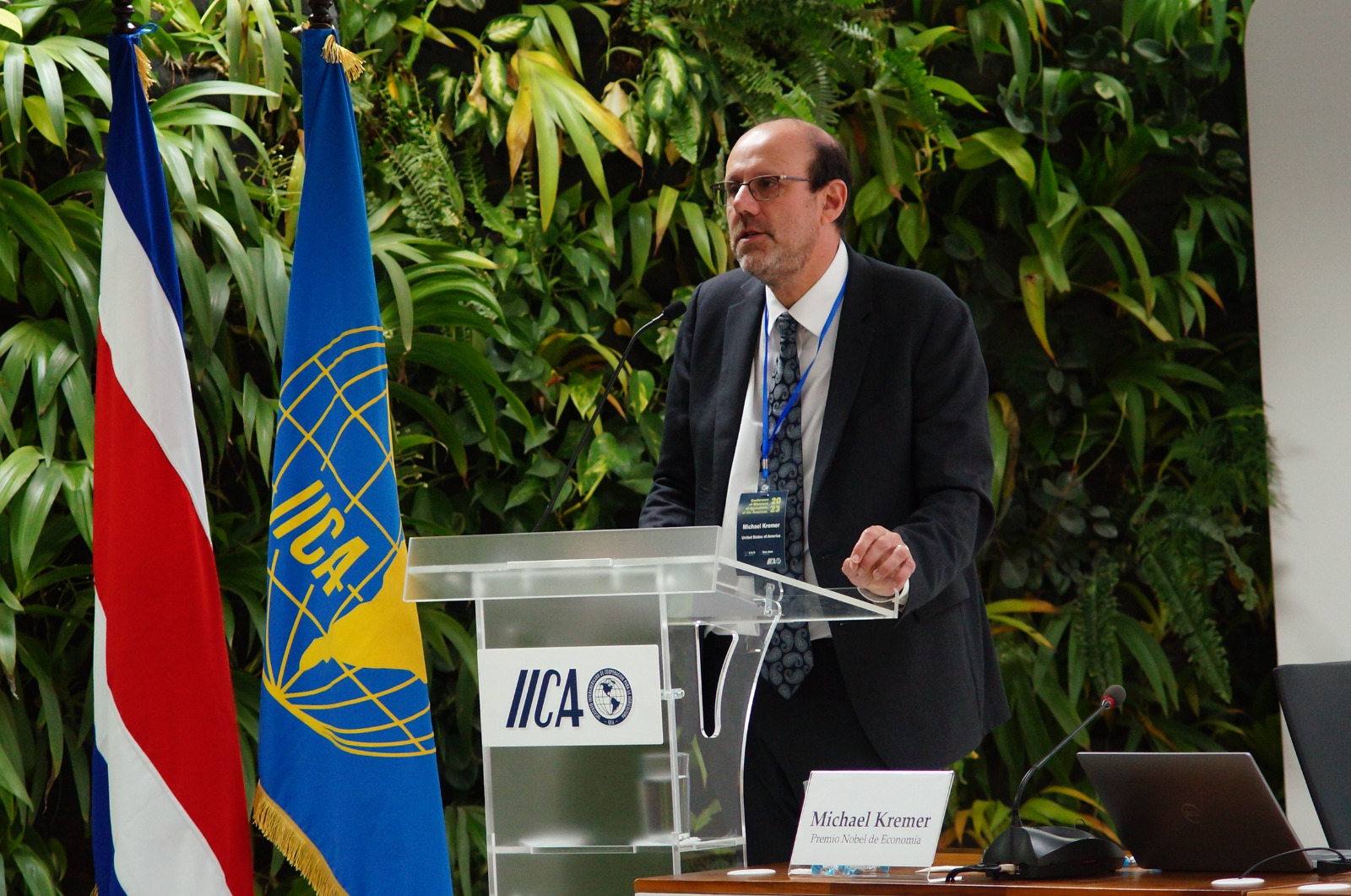The meeting of ministers, which opened with an appeal to strengthen the role of the hemisphere in guaranteeing global food security and environmental sustainability within the context of the climate and economic crises, will end on Thursday, 5 October.

San Jose, 4 October 2023 (IICA) – Access to new technologies can significantly improve the quality of life of Latin American and Caribbean small farmers at a very low cost, maintained 2019 Nobel Prize laureate for Economics, Michael Kremer, during his keynote address at the Conference of Ministers of Agriculture of the Americas 2023 in San Jose, Costa Rica.
“Today we live in a digital world, where we share information in a highly economical way. And for the most vulnerable farmers, having access to weather forecasts or information about soil composition can make a huge difference. The benefits far outweigh the costs”, said Kremer, who in 2019 was appointed by the Inter-American Institute for Cooperation on Agriculture (IICA) as a Goodwill Ambassador for Sustainable Development.
The economist and University of Chicago professor led the forum on “Bridging Gaps in Innovation, Science and Technology, with Special Emphasis on Digital Agriculture and the Bioeconomy” at the conference organized by IICA and held at its Headquarters. The conference brought together 32 ministers of the Americas, alongside senior national authorities and representatives of international organizations, rural leaders, world renowned academics and members of the production and industrial sectors.
The meeting of ministers, which opened with an appeal to strengthen the role of the hemisphere in guaranteeing global food security and environmental sustainability within the context of the climate and economic crises, will end on Thursday, 5 October.
Kremer, who holds a doctorate from Harvard University and is the Director of the Development Innovation Lab at the University of Chicago’s Development Economics Center, cited numerous examples in which family farmers around the world have seen tremendous benefits from incorporating simple technologies into food production.
In particular, he stressed the impact of smart phones and internet connectivity on the most vulnerable rural inhabitants, pointing out that, “Many studies worldwide have provided evidence that small farmers have adjusted their investment decisions and behavior based on weather forecasts. The cost-benefit ratio is very attractive, as profit gains could increase by 10% if forecasts are accurate”.
Innovations in social protection
The decorated economist also indicated that Latin America has been a pioneer in developing social protection innovations, which will become more important in the future with the increasing impact of climate change on people’s lives. “Today we respond by introducing emergency relief programs in the aftermath of extreme events, but we must also take preliminary measures. For example, a flood can be disastrous for farmers, but if they are given information in advance, they could introduce measures to cushion the blow”, he argued.
Kremer also spoke about the role of science and research, providing several examples. For one, he spoke about microbial fertilizers that use bacteria to facilitate the absorption of nutrients in plants and to improve soil health, explaining that, “They have tremendous potential as an alternative to synthetic fertilizers, as they boost production yields and reduce greenhouse gas emissions. They have been developed extensively in Brazil”.
The economist referred to the complex current scenario, characterized by overlapping global crises. He announced that the University of Chicago had launched a new Commission for Climate Change, Food Security and Agriculture whose members include former Mexican President Ernesto Zedillo and former Colombian Minister of Finance Mauricio Cárdenas. The purpose of the commission is to support innovations for climate adaptation and mitigation.
The ministers closely followed Kremer’s presentation, recognizing his extensive experience. Kremer has introduced family farmers in different parts of the world to digital agriculture services that provide technical assistance and rural extension — both key to improving the yields and increasing the income of the weakest link in the agriculture sector.
“There is a considerable gap between our countries in terms of technology access”, acknowledged Augusto Valderrama, Minister of Agricultural Development of Panama, who reported that his country had undertaken “a transformation process aimed at digitalizing agricultural processes, with the support of IICA. We can make technology friendly for our producers. That is the only way forward; there is no other alternative”.
Ariel Martínez, Undersecretary of Policy Coordination at Argentina’s Secretariat of Agriculture, Livestock and Fisheries, referred to the role of biotechnology in his country’s agricultural production. “Thanks to solid governance, we are among the leading global players in this field”, he noted. He emphasized the fact that “our greatest concern is producing more with less, increasing traceability in production and generating conditions for climate change adaptation”.
“Science and technology are the only means for increasing agricultural productivity, combating food insecurity, increasing income for farmers, reducing the environmental footprint of production, and tackling climate change”, remarked Tom Rosser, Assistant Deputy Minister at Agriculture and Agri-Food Canada.
More information:
Institutional Communication Division.
comunicacion.institucional@iica.int











